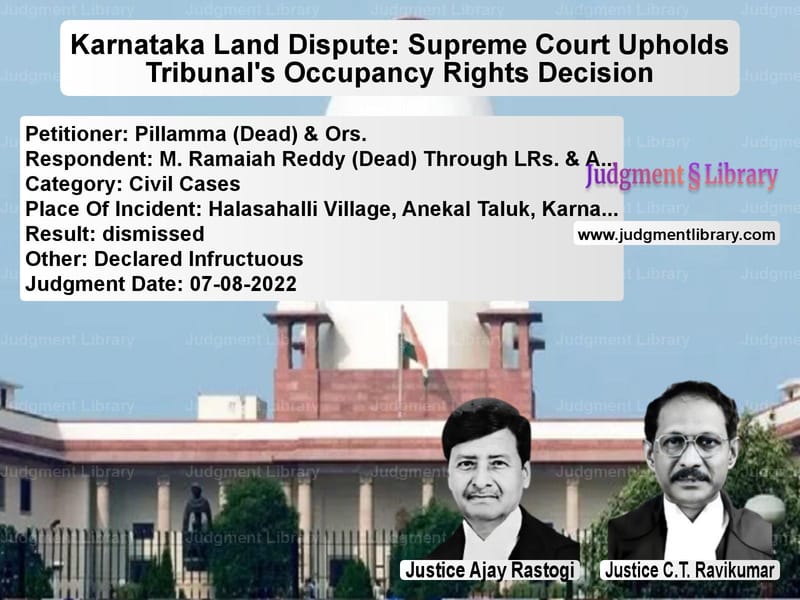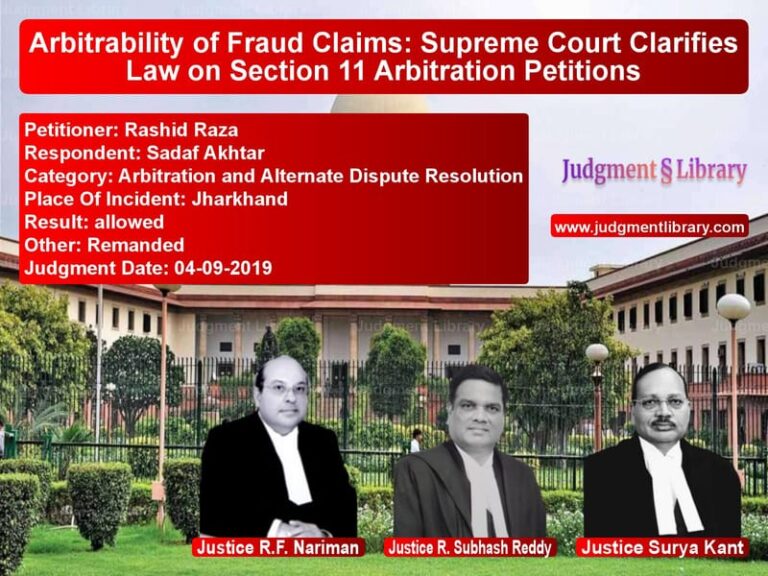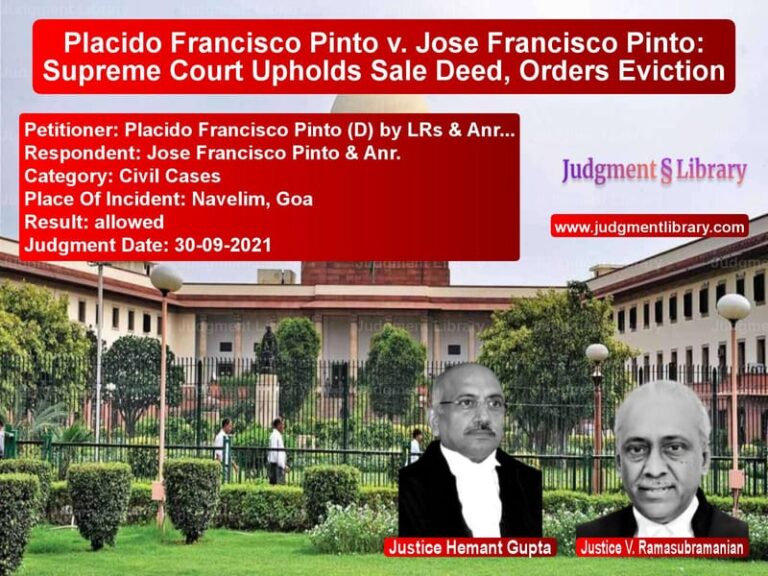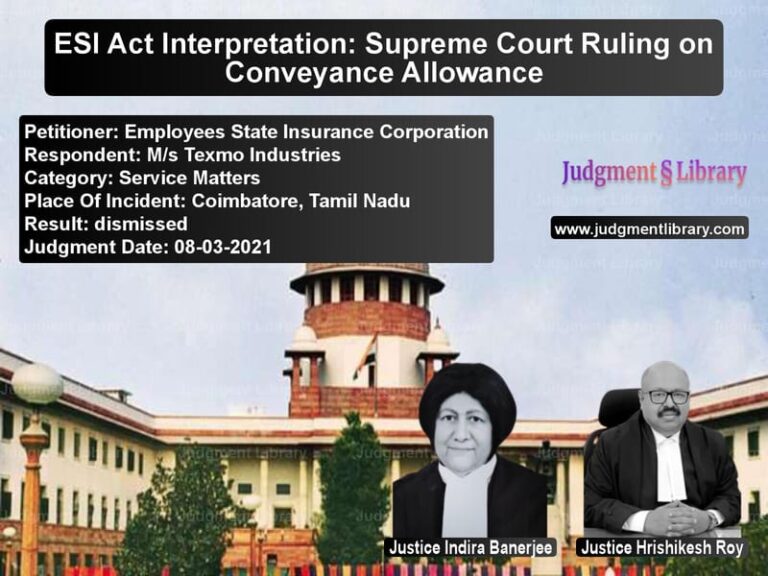Karnataka Land Dispute: Supreme Court Upholds Tribunal’s Occupancy Rights Decision
The case of Pillamma (Dead) & Ors. vs. M. Ramaiah Reddy (Dead) Through LRs. & Anr. revolves around a long-standing dispute over occupancy rights under the Karnataka Land Reforms Act, 1961. The Supreme Court, in this judgment, upheld the findings of the Karnataka Land Tribunal, affirming occupancy rights in favor of the respondent, while dismissing the appeal filed by the appellants.
Background of the Case
The dispute concerns agricultural land situated in Halasahalli Village, Anekal Taluk, Karnataka, specifically:
- Survey No. 184, measuring 10 acres and 34 guntas
- Survey No. 17, measuring 1 acre and 12 guntas
The first respondent had filed an application in Form No. 7 on December 3, 1974, under Rule 19(1) of the Karnataka Land Reforms Rules, seeking registration of occupancy rights under Section 45(A) of the Karnataka Land Reforms Act, 1961.
The respondent claimed that he had been cultivating the land as a tenant and was entitled to be recognized as an occupant under the law. However, the appellants opposed this claim, arguing that they had purchased the land in 1970 through a registered sale deed and that the respondent was a mere trespasser.
Legal Issues Before the Court
The Supreme Court was required to determine:
- Whether the respondent had lawful tenancy rights over the land.
- Whether the Karnataka Land Reforms Act, 1961, was applicable in this case.
- Whether the Tribunal’s decision to grant occupancy rights to the respondent was legally justified.
Arguments Presented
Petitioners’ (Appellants’) Arguments
- The appellants claimed that they had purchased the land through a registered sale deed on July 10, 1970, and therefore were the rightful owners.
- They contended that the first respondent was not a tenant but a trespasser and had no legal claim over the land.
- They pointed out that the respondent had earlier claimed ownership under the Karnataka (Personal & Miscellaneous) Inams Abolition Act, 1954, but failed to prove his case.
- The appellants asserted that since the respondent’s claim had been rejected under the 1954 Act, he could not later claim occupancy rights under the 1961 Act.
Respondents’ Arguments
- The first respondent maintained that he had been in possession of the land as a tenant before the vesting date of March 1, 1974, under the Karnataka Land Reforms Act, 1961.
- He argued that his tenancy was recognized in prior legal proceedings and that he had been cultivating the land lawfully.
- He pointed to earlier judicial findings that established his continuous possession, which supported his right to occupancy.
Supreme Court’s Observations
On the Applicability of the Karnataka Land Reforms Act, 1961
The Supreme Court, comprising Justice Ajay Rastogi and Justice C.T. Ravikumar, analyzed the scope and applicability of the Karnataka Land Reforms Act, 1961, in light of previous judgments.
“Under the scheme of the Act, 1954, all lands in Inam villages vested in the State Government. However, under the Act, 1961, only lands held by or in possession of tenants immediately prior to March 1, 1974, vested in the State Government.”
The Court clarified that the respondent’s claim needed to be examined based on his possession on the vesting date.
On the Tribunal’s Decision
The Court reviewed the Tribunal’s order, which had examined all relevant evidence before granting occupancy rights.
“The Tribunal recorded a finding that on March 1, 1974, the subject land was in possession of the first respondent and his father, as admitted by the appellants in earlier proceedings. The respondent’s father had lawfully cultivated the land and became a deemed tenant under Section 4 of the Act, 1961.”
The Supreme Court noted that the Tribunal had based its decision on credible evidence, including prior admissions by the appellants regarding the respondent’s possession.
On the Appellants’ Claim of Ownership
The appellants had argued that their 1970 sale deed gave them ownership over the land. However, the Court rejected this claim, emphasizing that the respondent’s possession on the vesting date (March 1, 1974) was the determining factor.
“The claim of ownership under the 1954 Act does not bar an independent inquiry under the 1961 Act. The Tribunal’s finding that the first respondent was in possession on March 1, 1974, was based on a proper assessment of evidence.”
On Previous Legal Precedents
The Supreme Court cited its earlier decision in Muniyallappa vs. B.M. Krishnamurthy (1992 Supp. (3) SCC 26), which had distinguished between the 1954 and 1961 Acts.
“The rejection of a claim under the Inams Abolition Act does not lead to the inference that a claimant has no rights under the Land Reforms Act. The purpose of the latter is to abolish the landlord-tenant relationship and confer occupancy rights on tenants.”
The Court concluded that the respondent had lawfully acquired occupancy rights based on the findings of the Tribunal.
Judgment and Its Implications
The Supreme Court upheld the Tribunal’s decision and dismissed the appeal filed by the appellants.
- The respondent’s claim of tenancy and occupancy rights was legally recognized.
- The appellants’ ownership claim was rejected as it did not override the tenancy rights granted under the 1961 Act.
- The Court affirmed that previous claims under different land laws do not automatically nullify tenancy rights under the Karnataka Land Reforms Act.
Significance of the Judgment
- Clarifies Land Tenancy Rights: The ruling reinforces the principle that lawful possession on the vesting date determines occupancy rights.
- Prevents Landlord-Tenant Disputes: The decision sets a precedent that tenant rights must be protected under the applicable land reform laws.
- Ensures Stability in Land Ownership Laws: The judgment upholds the legal framework of the Karnataka Land Reforms Act, ensuring fair adjudication of land disputes.
Conclusion
The Supreme Court’s ruling in Pillamma (Dead) & Ors. vs. M. Ramaiah Reddy (Dead) Through LRs. & Anr. is a landmark decision in Karnataka land reform jurisprudence. By affirming the Tribunal’s findings, the Court has reinforced the legal protections available to tenants under the Land Reforms Act, 1961. This judgment not only settles the specific dispute but also strengthens legal certainty in similar land ownership conflicts.
Petitioner Name: Pillamma (Dead) & Ors..Respondent Name: M. Ramaiah Reddy (Dead) Through LRs. & Anr..Judgment By: Justice Ajay Rastogi, Justice C.T. Ravikumar.Place Of Incident: Halasahalli Village, Anekal Taluk, Karnataka.Judgment Date: 07-08-2022.
Don’t miss out on the full details! Download the complete judgment in PDF format below and gain valuable insights instantly!
Download Judgment: pillamma-(dead)-&-or-vs-m.-ramaiah-reddy-(de-supreme-court-of-india-judgment-dated-07-08-2022.pdf
Directly Download Judgment: Directly download this Judgment
See all petitions in Property Disputes
See all petitions in Landlord-Tenant Disputes
See all petitions in Succession and Wills
See all petitions in Judgment by Ajay Rastogi
See all petitions in Judgment by C.T. Ravikumar
See all petitions in dismissed
See all petitions in Declared Infructuous
See all petitions in supreme court of India judgments August 2022
See all petitions in 2022 judgments
See all posts in Civil Cases Category
See all allowed petitions in Civil Cases Category
See all Dismissed petitions in Civil Cases Category
See all partially allowed petitions in Civil Cases Category







